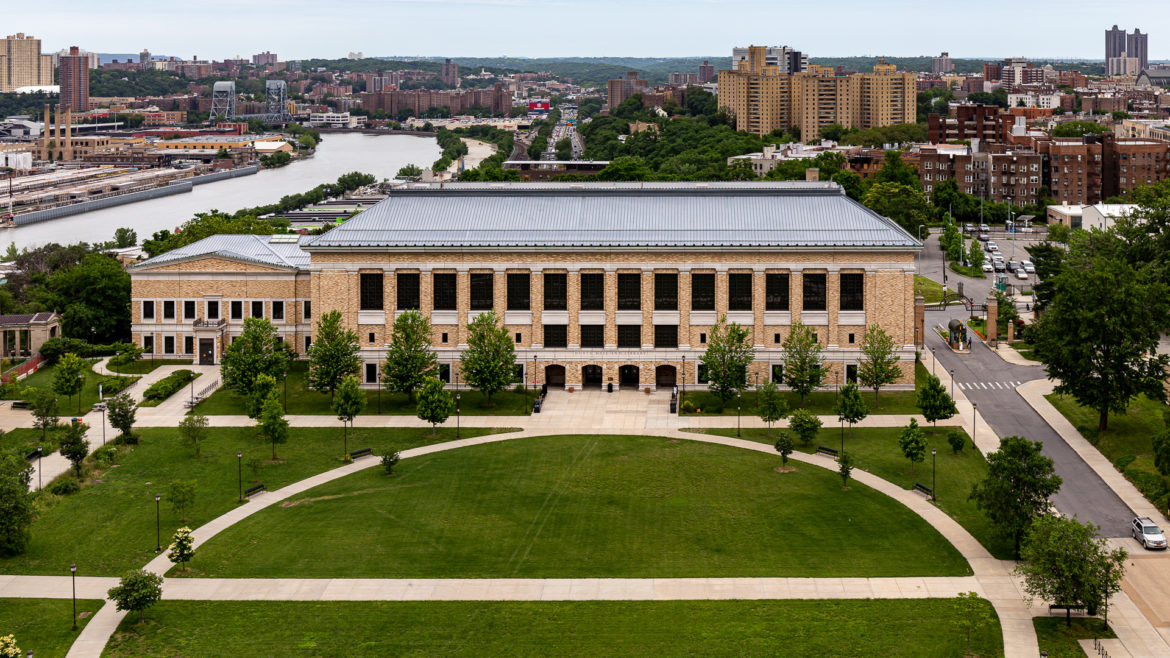“Since CUNY is one of the city’s most traversed pathways out of poverty, any decision to block or compromise this escape route must be considered for its short and long-term consequences.”

Adi Talwar
The Bronx Community College campus.Once again New York City and state get ready for March Madness—when advocates, lobbyists, and elected officials compete to influence city and state budgets.
Between us, a long-time CUNY professor and a CUNY doctoral student, we have observed almost 60 such cycles. We are struck by how often mayors and governors invoke austerity as the most responsible fix for any budget challenge—including for CUNY.
But despite earlier threats of budget cuts from the mayor and the governor, this year could be different. Already some proposed cuts have been rolled back in response to pressure from advocates and legislators. And a rosier economic outlook for the city, as well as state budget surpluses, mean more budget options for the next fiscal year.
To realize this opportunity, all New Yorkers who benefit from CUNY—students, graduates, their families, and employers—should urge their elected representatives to reject the default to austerity. After all, budget decisions are political decisions. And too often the choice to cut spending is fueled by pervasive myths about austerity, illusions which have long thwarted rational discussion of city and state budgets.
We focus on city and state budgets for CUNY because it plays such a critical role in the educational, economic, and social lives of so many New Yorkers. Since 1991, about 1 million people have graduated from CUNY, 850,000 of whom now work and pay taxes in New York. More than 80 percent of CUNY’s graduates stay in New York and contribute to the region’s economy, culture, and vitality.
Today, more than 225,000 degree-seeking students attend CUNY and another 200,000 take continuing education courses. Along with their families, more than 1 million New Yorkers have their daily lives and future economic success touched by CUNY.
Since CUNY is one of the city’s most traversed pathways out of poverty, any decision to block or compromise this escape route must be considered for its short and long-term consequences. In this spirit, we identify four myths on austerity for CUNY that need de-bunking:
Myth 1: Forcing CUNY to cut its spending will save taxpayers money. In December 2023, CUNY requested $2.3 billion for its operating budget from Gov. Kathy Hochul, representing about 1 percent of the state’s $233 billion budget for 2025. CUNY requested $53 million from New York City to support its community colleges—about 5 cents for every $100 in the mayor’s $109 billion budget proposal. These figures show that CUNY constitutes a small portion of state and city budgets, and further cuts to CUNY’s modest requests yield miniscule savings to taxpayers.
Myth 2: New York faces a precarious economy, so cuts are necessary to save for a rainy day. The state and city currently hold record high “rainy day” and reserve funds of $19.5 billion and $3.1 billion, respectively. Rather than cut essential services to be ready for some hypothetical rainstorm, New York should invest in its college students now to build prosperity for future years. Moreover, several recent economic forecasts suggest continued prosperity for the region, with rainy days not yet on the horizon.
Myth 3: A college education is no longer essential to the city’s economy, so cuts are not so harmful. While experts debate this topic, in New York City, young people without post-secondary degrees face the harshest job market. On average, a CUNY graduate with a baccalaureate degree earns $65,165 annually ($93K for those with a CUNY masters), compared to $33,000 for those without degrees. Failing to seize the opportunity to expand the number of students who benefit from CUNY and its capacity to give young people the tools they need for future success is penny-wise and pound-foolish.
Myth 4: The city can’t fund everything. It’s true that New York City faces other challenges that require significant new resources, including the city’s migrant crisis and the need for more affordable housing. But robbing Peter to pay Paul overlooks the potential for new revenue sources, like new corporate taxes, capital gains taxes or the proposed bill which would require NYU and Columbia to send the property taxes they do not pay to fund CUNY.
We call on CUNY students, graduates, and family members—on the millions of New Yorkers who have benefited from a robust and caring public university—to take on the role of myth busters and urge our leadership to find the courage to reject austerity. Let the mayor, governor and city and state legislators know that we believe budget decisions should be based on facts and hope, not myths and unfounded fears.
Nicholas Freudenberg is a distinguished professor of public health, and Alexa D’Angelo is a fifth-year doctoral student, both at the CUNY School of Public Health.








